- Home
- Glynn Stewart
The Terran Privateer Page 4
The Terran Privateer Read online
Page 4
The headset faked being a decorative headband well, but not perfectly enough to fool a practiced eye that could identify the “stones” that were actually cameras. Everything the woman saw and heard was recorded, though probably not transmitted live.
If it was being transmitted live, Annette would make sure heads rolled.
“Captain Bond, the people of Earth need to hear from the woman of the hour,” the reporter said fiercely, her eyes flashing conviction. “Many have questions as to how a woman who hasn’t been a Space Force officer in over four years now holds what we are told is suddenly the premier command in the Force!”
“Technically, I have always been a reserve officer,” Annette pointed out, swallowing her anger. Recorded or live, punching out a news reporter on camera was a bad idea. “Who are you?” she demanded.
“Jess Robin, Global News Network,” the woman replied crisply. “Reserve or not, you haven’t been an active duty officer in years, and have suddenly leapt past officers with years of experience to command this unique vessel. Many of our viewers wonder just how a woman such as yourself got the role.”
Annette stepped forward into Robin’s space, pushing the taller and more conventionally attractive woman back a step.
“Are you really going there, Miss Robin?” she asked. “Last time I checked, this was the twenty-second century. Isn’t it a little out of date to imply I’m sleeping with someone to get my job?”
The reporter, to her credit, actually looked embarrassed. That stinker had to have been fed to her in advance, and she’d managed it with aplomb.
“Then explain to our viewers why you were selected for this command over so many experienced officers?” she finally managed to recover and ask.
Annette sighed. Her options had narrowed down to punching the woman or answering her question. Annoying as the affair was, she couldn’t gracefully extract herself now.
“As you said, Tornado is unique,” she said quietly, forcing Robin to give up some of the personal space she’d defensively reclaimed to guarantee her recording. “Many details of her specifications are classified, but the key point is one that isn’t: Tornado possesses an interface drive.
“Interface drives are reactionless and inertialess—they’re giving physicists a headache across the entire star system. The skills necessary to handle one are entirely different from a fusion torch ship—the ‘experience’ you speak of has now become obsolete.
“No one else in this system has as much experience with the interface drive as my crew does, so the Space Force brought us in to man the first true starship of the United Earth Space Force,” she concluded. “My understanding is that Nova Industries intends to start delivering civilian interface drive ships inside the next four months—before the end of the year.
“It is necessary for the Space Force to have ships capable of matching the performance of those civilian vessels to maintain our role as the arbiter of peace in the system.
“That requires a crew and captain experienced with this type of ship. I was not selected over more experienced officers, Miss Robin,” she said flatly. “I was selected because I was the only experienced officer.”
Robin made an odd glance aside, and Annette realized she was wearing video contacts linked to the headset. Someone was getting a live feed and sending the reporter questions. From the way her face momentarily twisted in disgust, the suggestions they were providing weren’t to her taste.
“Is it true, Captain, that Dark Eye is suggesting we’re going to see alien contact in the next few years?” she finally asked, and Annette stared at her for a long moment. The reporter had acquired a mischievous grin that made her all-too-perfect face suddenly far more human—and much more attractive.
“I have no idea what you’re talking about,” she said slowly while reminding herself the reporter was at least ten years her junior.
“Please, Captain, the Dark Eye Interstellar Surveillance System is an open secret now,” Robin insisted. “You’d have been briefed on it as a senior Nova Industries employee, let alone as a Space Force Captain!”
“Miss Robin,” Annette said flatly. “If some sort of sensor net like you discussed existed, I would not be allowed to talk about it, regardless of whether or not the secret had been compromised.”
Dark Eye was a network of small and mid-sized satellites spread throughout the inner system, a joint Nova–Space Force project. She’d seen the results and agreed with Casimir—somebody was out there. She was also bound not to talk about it by both her Nova Industries’ nondisclosure agreement and the United Earth Space Force Code of Justice.
“But if aliens were coming, they’d have ships like Tornado?” Robin asked.
That was a sensible question. From the way the reporter’s eyes were flickering to read whatever feed was coming to her contacts, it was probably less sensationalized than her bosses liked.
“Most likely,” Annette allowed. “That is why Admiral Villeneuve is seeking funding to upgrade the Space Force as quickly as we can. Our fusion-torch warships are obsolete; they would stand no chance against a fleet of ships similar to Tornado.”
Out of view of her headset’s cameras, Robin made a clear “touché” gesture. Whether she’d meant to or not, she’d allowed Annette to bring the conversation around to convincing people to support the Admiral’s expansion plan.
The reporter opened her mouth to ask another question, but she was cut off as every Space Force communicator in the room went off with an emergency alert.
Annette pulled hers out and opened the scroll-like device, skimming the text. Dark Eye had detected multiple hyperspace portals forming just inside the asteroid belt. Current estimate was twenty ships had emerged from hyperspace fifteen minutes previously.
Even if all four XC hulls and the new survey flotilla were complete and online—which they weren’t—Earth didn’t have twenty hyper-capable starships.
Chapter 5
The room exploded into chaos. Annette waved the reporter back and charged into the crowd, forcing her way through to Admiral Villeneuve. The UESF Chief of Operations was surrounded by shouting, swearing, panicking officers
“Admiral!” She tried to get his attention, shoving through the crowd somewhat gently. Villeneuve didn’t seem to hear her, and then someone shoved her back.
She recognized Commodore Anderson about half a second after twenty-five years of martial arts training kicked in and dropped the big logistics officer to the ground with a resounding thud.
That got everyone’s attention, a circle of space appearing around her and allowing Admiral Villeneuve to turn his gaze on her.
“Captain Bond?” he asked slowly.
“Sir, Tornado has eight interface drive shuttles aboard,” she told him crisply. “If everyone can calm down, we can send the civilians to Orbit One on the torch shuttles and have all of the Space Force officers back to their ships in under ten minutes.”
Villeneuve’s gaze flickered to where Anderson was groaning to his feet, but even the man Annette had just floored was looking at her with a degree of surprised respect—and hope.
“Make it happen,” the Admiral ordered. “I’ll stay aboard Tornado.”
“With respect, sir, your place is on Orbit One,” Annette told him quietly, stepping closer to the Admiral as she gestured to Kurzman to start corralling people. “Someone has to take overall command of Earth’s defense. You can’t be at the tip of the spear—and we both know Tornado has to be the tip of the spear.”
For a moment, the senior uniformed officer of Earth’s defenses looked rebellious, but then Villeneuve sighed and nodded.
“You’re right, of course,” he confessed. “I’ll coordinate the civilians and be available by communicator until I’m in Command.” Villeneuve glanced around. “I’m placing you under Harrison’s command, with Alpha Squadron. She’ll have her orders by the time she’s aboard Challenger.”
“Yes, sir,” Annette told him. “We won’t fail you.”
“
I’m not worried about you failing me,” Villeneuve said quietly. “I’m worried that we’ve already failed Earth.”
#
Annette reached her bridge as the last of the interface drive shuttles exited the launch bay. That part was done on chemical rockets, not even fusion thrusters, to keep the mothership safe. Once the shuttle was a kilometer or so clear of Tornado, their smaller drives turned on and they whisked away at forty percent of the speed of light.
Their courses amidst the cluster of warships in high earth orbit were very carefully calculated. Each flight between ships lasted seconds at most. They were spending more time docking and offloading passengers than they were flying at full speed.
Beneath the fleet, rapidly dropping away toward Earth and the geostationary orbit of Orbit One, Earth’s largest space station and the Space Force’s command center, were the old-style shuttles that had originally brought the Captains. It would have taken forty-five minutes or more for those ships to get their passengers home.
Ahead of the rest of the shuttles was the one carrying Admiral Villeneuve, pushing the limits of what its artificial gravity could handle to get the Admiral to the command center before everything came apart.
“What are our visitors doing?” Annette asked as she dropped into the command chair at the center of the horseshoe-shaped bridge and put on her command headset.
“They spent five minutes sorting out their formation and started heading our way,” Harold Rolfson, now Lieutenant Commander Rolfson and her tactical officer, reported. “Definitely interface drive ships, but either their tech is behind ours or they’re taking it slow. Inbound at point one cee.”
“Any idea on the size?”
“Dark Eye is trying to resolve, but the sensors weren’t built for that,” Rolfson told her. The new rank had put the man in Space Force blue working fatigues, but so far they hadn’t managed to convince him to trim his shaggy red hair or beard. Annette had quietly squished one complaint from a regular Force officer already.
“They were built to sweep everything within a hundred light-years, not give us shiny pictures of ships inside the Belt,” Annette agreed. “Check with Solar Traffic Control—their sensors should be able to give us a better idea.”
“Yes, ma’am!” Rolfson replied. “I didn’t think of that.”
“We’re all trying not to panic, Harold,” she reminded him. “It’s going to be a rough day.”
“Ma’am, we have a signal from Challenger,” said Annette’s new com officer, a Space Force regular named Yahui Chan. She was a tiny Chinese woman, delicate-boned and dark-haired, and seemed to know her job inside and out. “Admiral Harrison sends her compliments and says that Alpha Squadron and escorts are moving out to intercept the unknowns. She requests that we accompany her.”
Annette nodded. She guessed that Harrison wasn’t sure whether Villeneuve had had a chance to tell Annette she was under the Admiral’s command.
“Inform Admiral Harrison we will take up high escort position above Challenger and that Tornado has been placed under her command,” she ordered Chan. “Lieutenant Commander Amandine”—she turned to the pale-skinned navigator—“please drop us into that position. We’ll stay in formation with the torch ships until ordered otherwise.”
“That’s going to be a bit of a headache, ma’am,” Amandine told her. “Our engines just don’t…work like that.”
“I know. Do your best,” she ordered.
“Ma’am.” Chan called for her attention again. “We’re receiving a transmission—it’s on the Space Force emergency frequency, using our encryption and file format, but the feed is just…weird.”
“Who’s transmitting?” Annette demanded. This was a bad time for anyone to be playing games with the emergency frequencies.
“I think…the aliens, ma’am.”
#
The image Chan put on the bridge’s main viewscreen sent shivers of atavistic fear down Annette’s spine. Without anything familiar to compare the creature to, there was no certainty to its size, but her hindbrain insisted that it was some giant monster from the deep, here to overturn fishing boats and eat primitive fishermen.
The alien was an immense, multi-armed, squid-like being. As Annette forced down her fear, she identified the four largest tentacles acting as legs, supporting the soft-skinned mass of the creature’s main body. Easily over a dozen smaller tentacles waved around the being, manipulating controls and moving screens. Strips of cloth wrapped around the body contained pockets and what she guessed to be insignia.
Four jet-black, unblinking, eyes were focused on the camera, and as the creature shifted, a hard black beak came into view. The beak opened and a series of sibilant hisses with an occasional beak snap came out.
It went untranslated long enough for Annette to think they were truly doomed, and then a voice overlay came onto the video—along with a scrolling text translation at the bottom of the screen.
“I am Tan!Shallegh, Fleet Lord for the A!Tol Imperium,” the alien commander told them. The voice it had presumably chosen was a soft male baritone with a crisp British Received Pronunciation accent. Both its name and the name of its empire included a strange beak-snapping sound that came surprisingly close to the clicks Annette had once heard a Xhosa junior officer use when calling home.
“Your system has fallen into my region of authority for some time. While my preference was to allow you to develop naturally, emissions from your new hyperdrives have drawn the attention of our enemies. It would be a failure in my responsibility to my Empress to allow your world to fall into the hands of those enemies.”
The creature paused, the hisses fading to silence. All of its tentacles twitched in the same direction in a gesture reminiscent of a shrug. Annette wondered if that was intentional—and if so, how long had this Tan!Shallegh been studying Earth?
“It is my responsibility to inform you that your system has now been annexed as a Class Four Dependent World of the Imperium,” the translation continued a moment after it started speaking again. “A planetary administration will be assembled over the next few five-cycles under an Imperial Governor. If you cooperate, elements of your existing government structures will be incorporated and a swift and peaceful transition will be achieved.”
The tentacles shivered again, in a gesture that did nothing for Annette’s calm.
“Resistance will be met with overwhelming force,” Tan!Shallegh told them flatly. “Your fate is decided. Yield and you will benefit. Fight and you will be crushed. I expect the full stand-down of your fleet within one twentieth-cycle of your receipt of this message.”
The image froze, though not before the text translation helpfully converted “one twentieth-cycle” into “seventy minutes”.
Silence reigned on Tornado’s bridge. An alert buzzed in Annette’s ear, and she tapped a command that linked Kurzman into her headset.
“What do we do, Captain?” her executive officer asked.
The same question was on all of her people’s faces as she glanced around her bridge, and she pitched her voice loud enough that everyone could hear.
“For now, we proceed on plan,” she told them. “Fall into formation on Alpha Squadron and move out to meet our tentacled friends. Responding to that bullshit is the Governing Council’s job.”
The Governing Council might not rule Earth—but its members commanded the Space Force. If they told Annette and her fellows to fight, they’d fight. If they told the United Earth Space Force to surrender…the Force would surrender.
Chapter 6
“Can you tell me what we’re looking at yet?” Villeneuve demanded as he stepped into the massive central command center on Orbit One. The room resembled nothing so much as an amphitheater, a central display tank showing the entire star system at a massive scale surrounded by ascending circles of monitors and workstations.
There were eighteen battleships and seventy-four cruisers in the United Earth Space Force. Somewhere in this room, there were at least five screens di
splaying data from each of those ships. Tornado’s section wasn’t fully online yet, but he’d passed a few techs improvising with screens stolen from the Belt Squadron.
“Yeah, but you’re not going to like it,” the commander center’s Shift Chief, a Rear Admiral James Mandela. He was a big black man who resembled the historical images of his famous ancestor more and more as he grew older.
“Captain Bond had the idea of using STC’s systems to get a clearer look,” Mandela continued. “That worked like a charm, enough to make the rest of us feel like idiots, but this is what we got.”
He gestured, and one of the techs flipped a feed up into the central display. Twenty silhouettes, with numbers and scales giving Villeneuve an idea of the size of what he was looking at—and how doomed Earth was.
“Twenty ships, exactly what Dark Eye estimated,” Mandela noted. “Eight big bastards just over two kilometers long, six mid-sized cruisers about on par with the new XCs, and six guys on par with our old battleships. The last six are hanging back,” he pointed out. “I’m guessing them as landing transports, an invasion force for if we refuse to comply.”
Admiral Jean Villeneuve looked at those twenty ships and felt the world fall out from underneath him. If those ships were remotely comparable to Tornado and the other XCs, one of the big ones outmassed his entire fleet. Most likely, they were even more advanced than Tornado and a single one of the cruisers could take on his entire fleet and win handily.
“Rear Admiral Mandela,” he said quietly, his words ashes in his mouth. “Issue the order to activate the Weber Protocols and go straight to Phase Two. My authority.”
The Weber Protocols were the policies and strategies designed for alien conquest of Earth, born at the same time as the Dark Eye program and the United Earth Space Force. At Phase Two, scientists and designers around the star system were going to be hustled into secret hiding places. Caches would be pre-placed, buried, and forgotten.

 Relics of Eternity (Duchy of Terra Book 7)
Relics of Eternity (Duchy of Terra Book 7)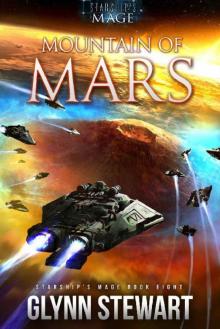 Mountain of Mars
Mountain of Mars Wardtown (Teer & Kard Book 1)
Wardtown (Teer & Kard Book 1) Noble's Honor (Changeling Blood Book 3)
Noble's Honor (Changeling Blood Book 3)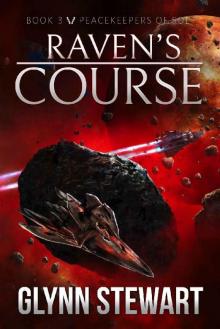 Raven's Course (Peacekeepers of Sol Book 3)
Raven's Course (Peacekeepers of Sol Book 3)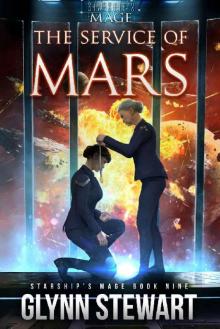 The Service of Mars
The Service of Mars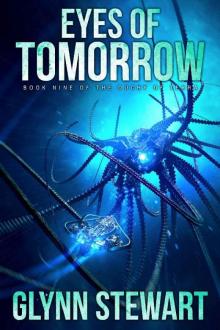 Eyes of Tomorrow (Duchy of Terra Book 9)
Eyes of Tomorrow (Duchy of Terra Book 9) Darkness Beyond (Light of Terra: a Duchy of Terra series Book 1)
Darkness Beyond (Light of Terra: a Duchy of Terra series Book 1) Drifter's Folly (Peacekeepers of Sol Book 4)
Drifter's Folly (Peacekeepers of Sol Book 4) Conviction (Scattered Stars: Conviction Book 1)
Conviction (Scattered Stars: Conviction Book 1)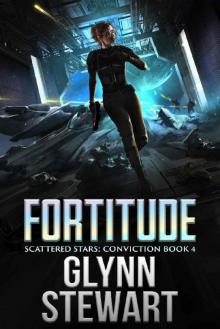 Fortitude (Scattered Stars: Conviction Book 4)
Fortitude (Scattered Stars: Conviction Book 4) Refuge
Refuge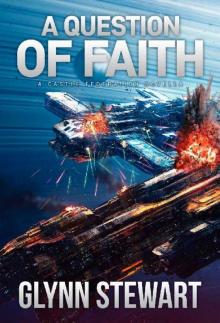 A Question of Faith: A Castle Federation Novella
A Question of Faith: A Castle Federation Novella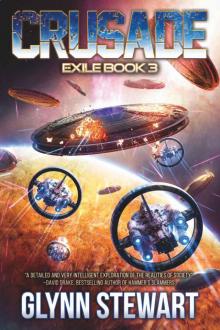 Crusade (Exile Book 3)
Crusade (Exile Book 3)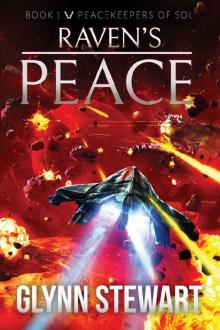 Raven's Peace
Raven's Peace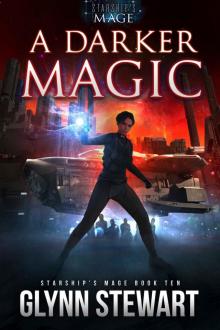 A Darker Magic (Starship's Mage Book 10)
A Darker Magic (Starship's Mage Book 10) Fae, Flames & Fedoras
Fae, Flames & Fedoras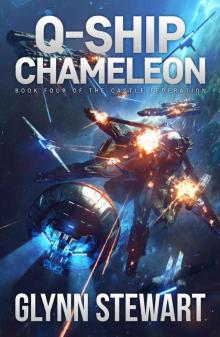 Q-Ship Chameleon
Q-Ship Chameleon Duchess of Terra (Duchy of Terra Book 2)
Duchess of Terra (Duchy of Terra Book 2)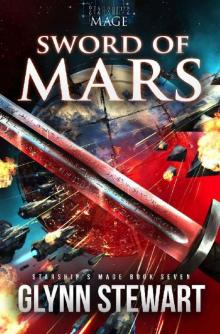 Sword of Mars
Sword of Mars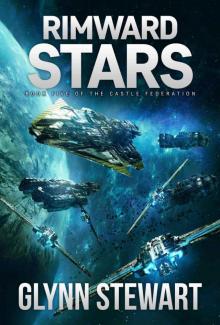 Rimward Stars (Castle Federation Book 5)
Rimward Stars (Castle Federation Book 5)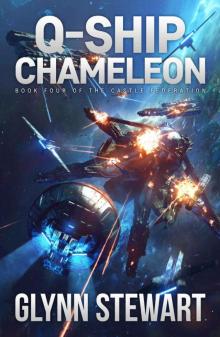 Q-Ship Chameleon (Castle Federation Book 4)
Q-Ship Chameleon (Castle Federation Book 4)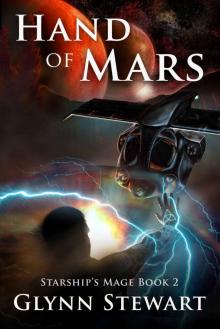 Hand of Mars (Starship's Mage Book 2)
Hand of Mars (Starship's Mage Book 2)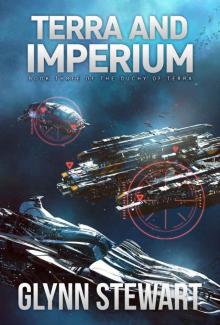 Terra and Imperium (Duchy of Terra Book 3)
Terra and Imperium (Duchy of Terra Book 3)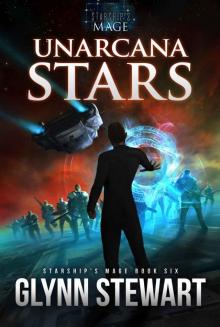 UnArcana Stars
UnArcana Stars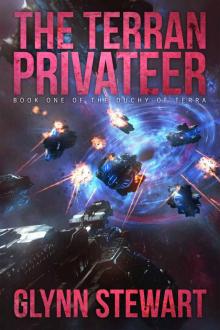 The Terran Privateer
The Terran Privateer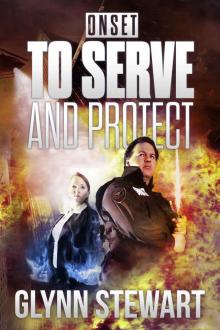 ONSET: To Serve and Protect
ONSET: To Serve and Protect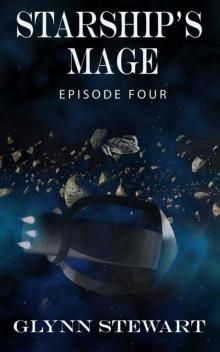 Starship's Mage: Episode 4
Starship's Mage: Episode 4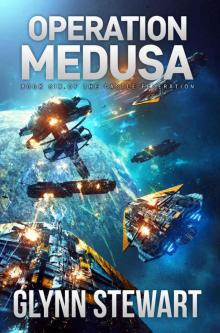 Operation Medusa (Castle Federation Book 6)
Operation Medusa (Castle Federation Book 6) ONSET: Blood of the Innocent
ONSET: Blood of the Innocent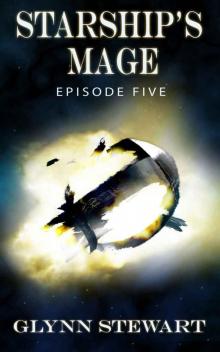 Starship's Mage: Episode 5
Starship's Mage: Episode 5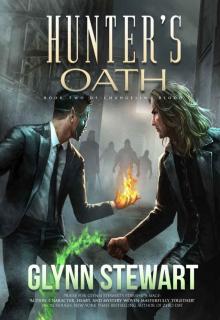 Hunter's Oath
Hunter's Oath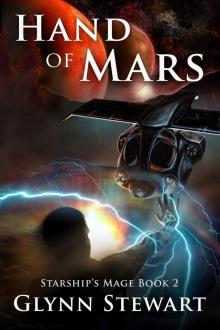 Starship's Mage 2 Hand of Mars
Starship's Mage 2 Hand of Mars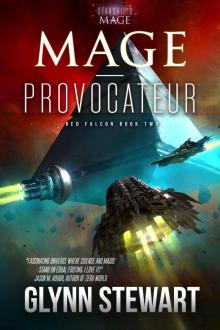 Mage-Provocateur (Starship's Mage: Red Falcon Book 2)
Mage-Provocateur (Starship's Mage: Red Falcon Book 2) ONSET: My Enemy's Enemy
ONSET: My Enemy's Enemy Blood Ward
Blood Ward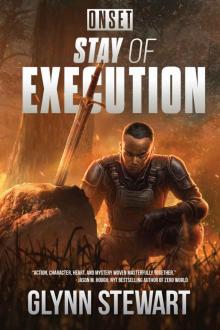 ONSET: Stay of Execution
ONSET: Stay of Execution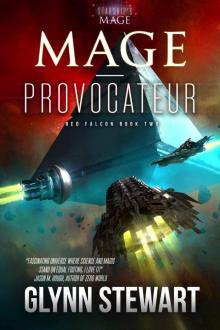 Mage-Provocateur
Mage-Provocateur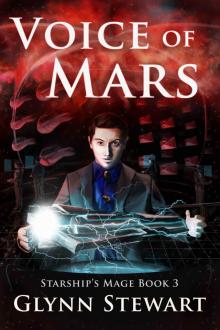 Voice of Mars (Starship's Mage Book 3)
Voice of Mars (Starship's Mage Book 3)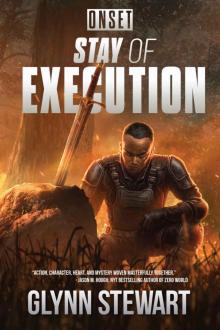 ONSET (Book 4): Stay of Execution
ONSET (Book 4): Stay of Execution Ashen Stars
Ashen Stars Children of Prophecy
Children of Prophecy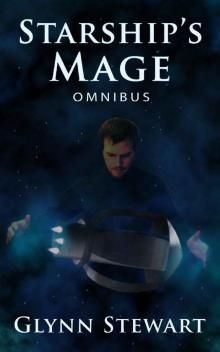 Starship's Mage: Omnibus: (Starship's Mage Book 1)
Starship's Mage: Omnibus: (Starship's Mage Book 1)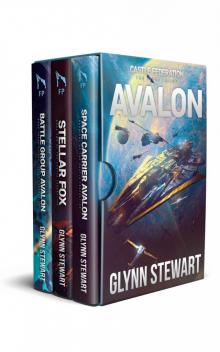 Avalon Trilogy: Castle Federation Books 1-3: Includes Space Carrier Avalon, Stellar Fox, and Battle Group Avalon
Avalon Trilogy: Castle Federation Books 1-3: Includes Space Carrier Avalon, Stellar Fox, and Battle Group Avalon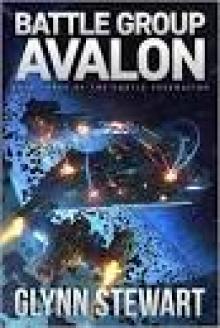 Battle Group Avalon (Castle Federation Book 3)
Battle Group Avalon (Castle Federation Book 3)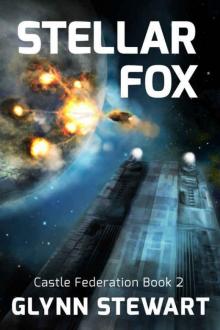 Stellar Fox (Castle Federation Book 2)
Stellar Fox (Castle Federation Book 2)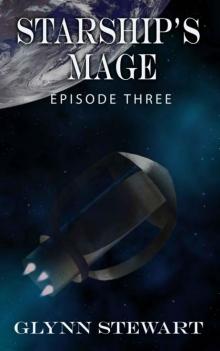 Starship's Mage: Episode 3
Starship's Mage: Episode 3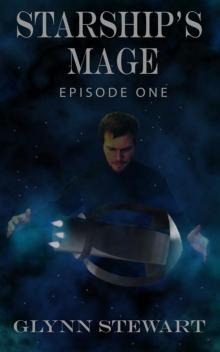 Starship's Mage: Episode 1
Starship's Mage: Episode 1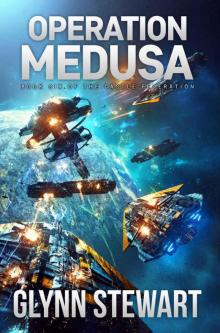 Operation Medusa
Operation Medusa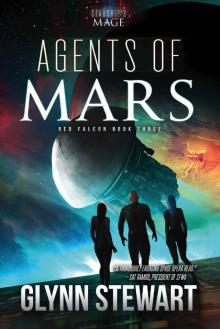 Agents of Mars (Starship's Mage: Red Falcon Book 3)
Agents of Mars (Starship's Mage: Red Falcon Book 3)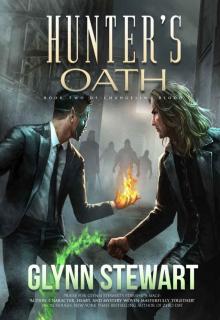 Hunter's Oath (Changeling Blood Book 2)
Hunter's Oath (Changeling Blood Book 2)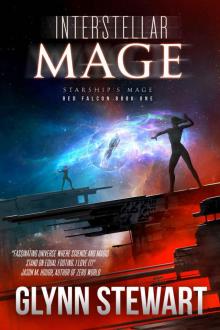 Interstellar Mage (Starship's Mage: Red Falcon Book 1)
Interstellar Mage (Starship's Mage: Red Falcon Book 1)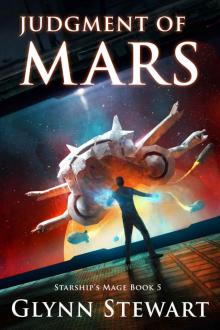 Judgment of Mars (Starship's Mage Book 5)
Judgment of Mars (Starship's Mage Book 5) Alien Arcana (Starship's Mage Book 4)
Alien Arcana (Starship's Mage Book 4)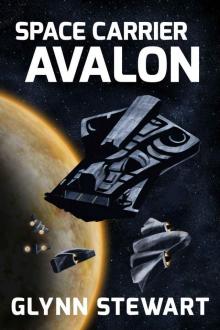 Space Carrier Avalon
Space Carrier Avalon Changeling's Fealty (Changeling Blood Book 1)
Changeling's Fealty (Changeling Blood Book 1)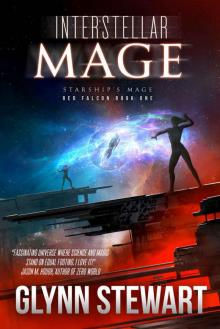 Interstellar Mage
Interstellar Mage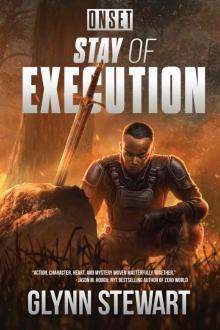 Stay of Execution
Stay of Execution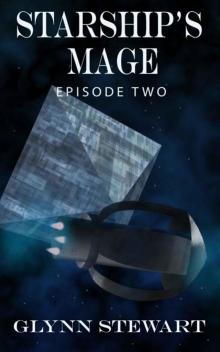 Starship's Mage: Episode 2
Starship's Mage: Episode 2